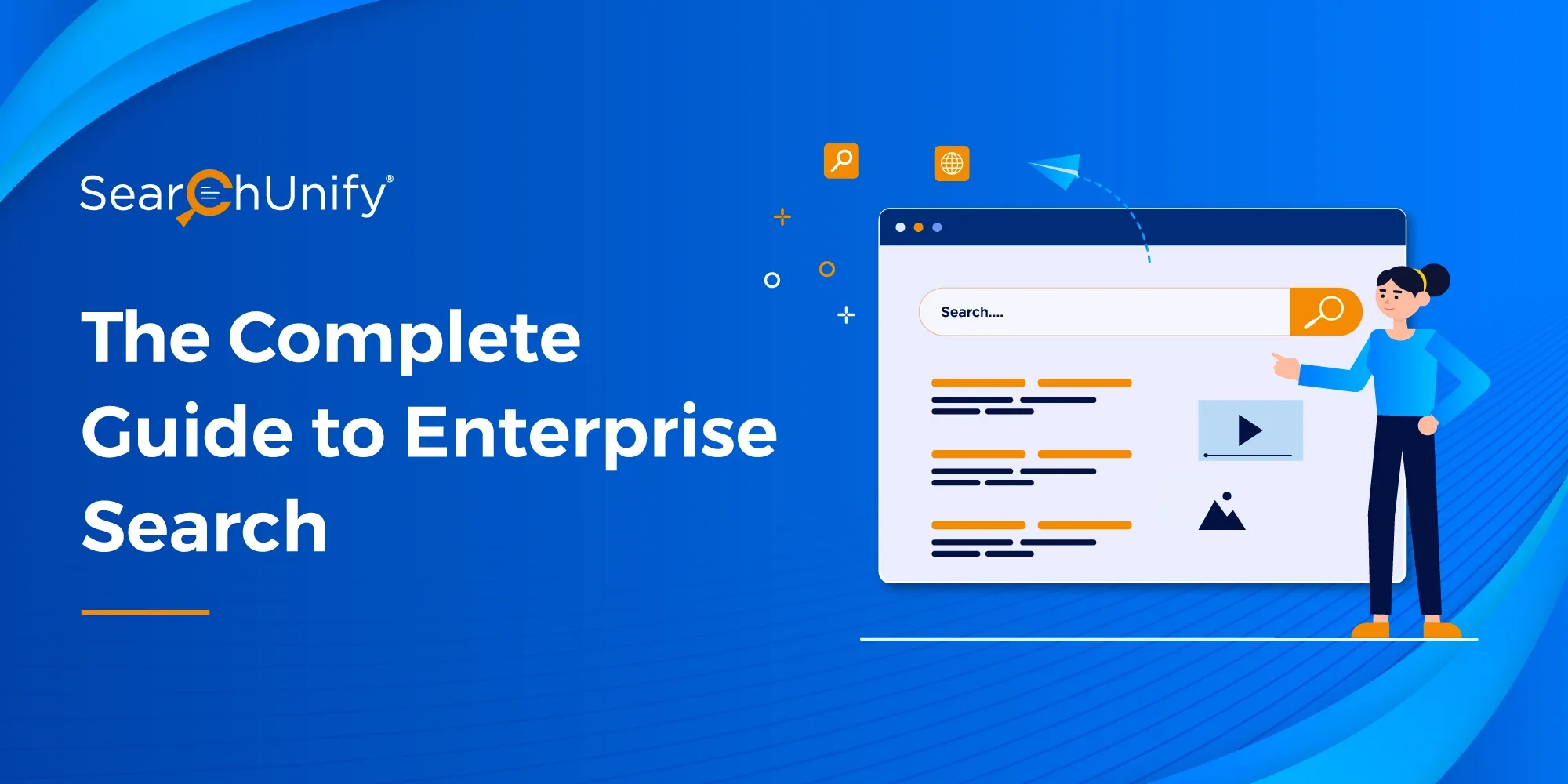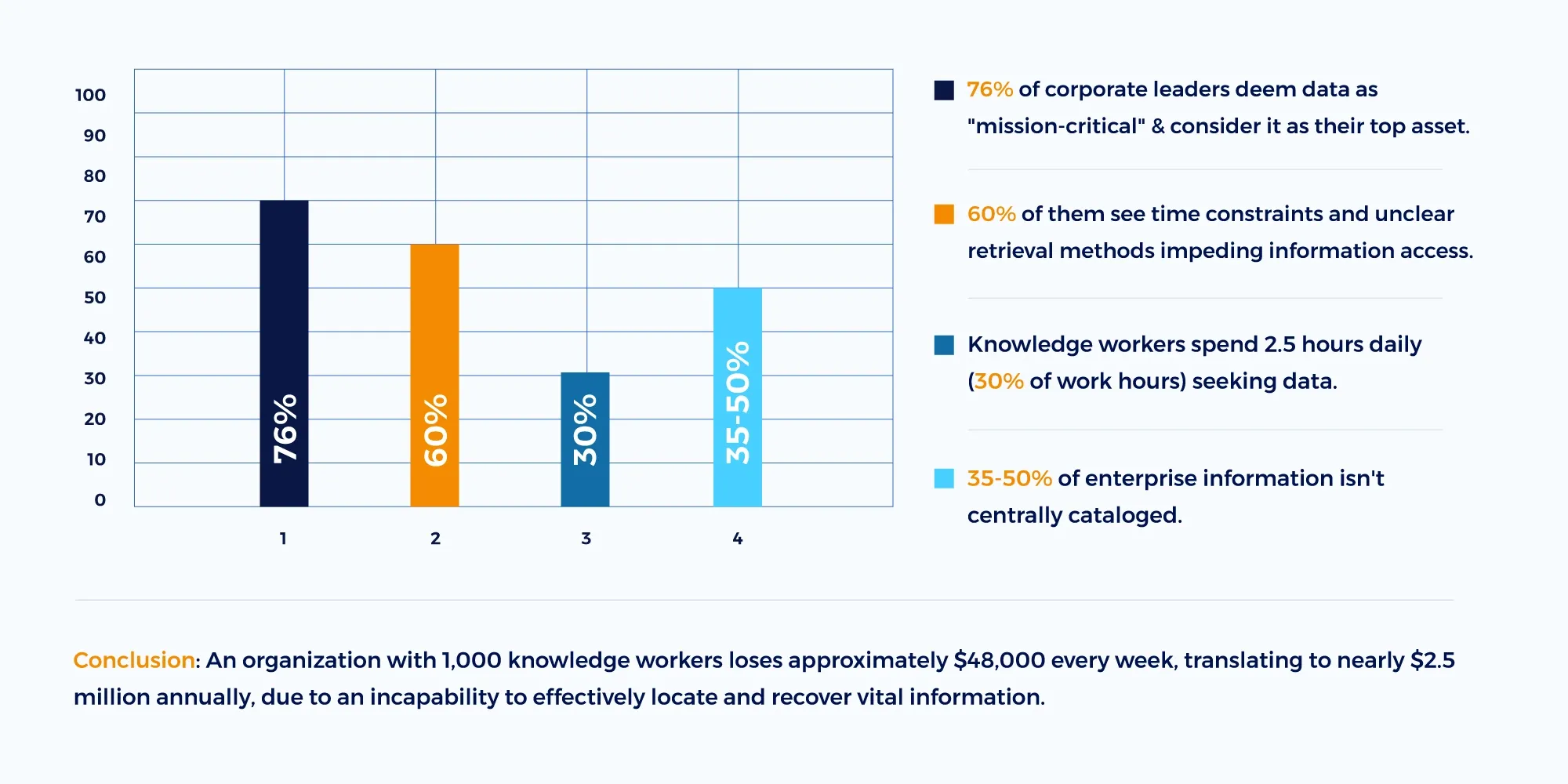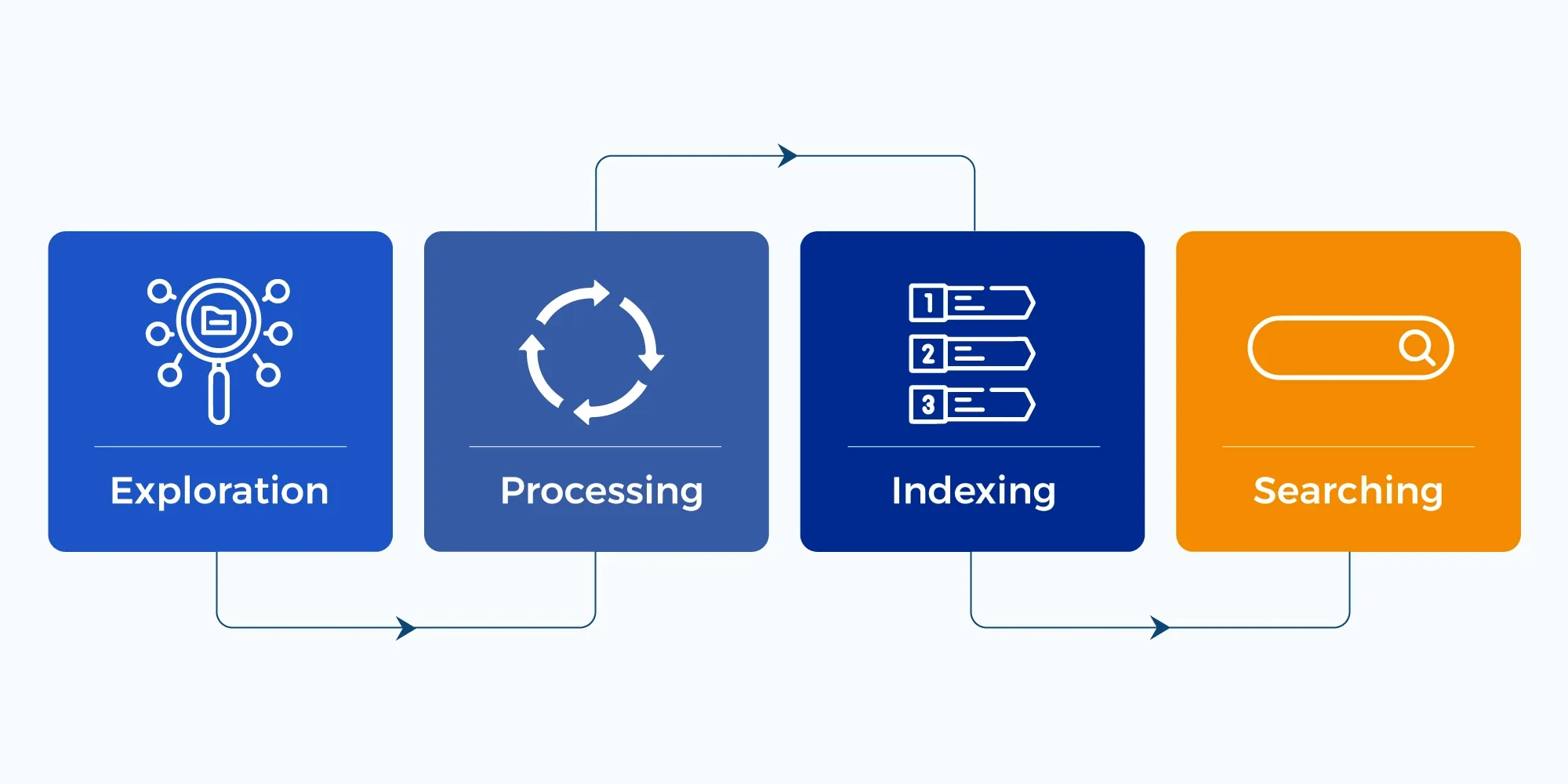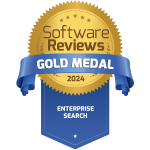
Popular search engines like Google and Bing are so embedded in our day-to-day lives that they’ve become synonymous with the concept of search.
Businesses, too, have started seeing search as a powerful tool and are heavily investing in enterprise search to stay ahead of the curve. Although web and enterprise search sound similar, they serve distinct purposes and operate quite differently.
Enterprise search is a specialized search technology that is designed to help customers, employees, and partners search for both structured and unstructured information across enterprise platforms such as bug tracking systems, customer communities, documentation portals, CMS, CRM, intranet, websites, etc.
1. Why Is Enterprise Search Important?
Knowledge is power. For organizations that deal with significant amounts of information day in and day out, enterprise search has become a non-negotiable. That is because it significantly reduces the time and effort required to locate the most relevant information an individual needs.

By unifying all data sources, enterprise search eliminates the need to search multiple content repositories, thus streamlining the search process and increasing efficiency.
For instance, support representatives can only see tickets and knowledge bases. They often don’t have access or time to go through the bug-tracking solution, a place where newfound bugs and their potential fixes might be documented.
Enterprise search solves this problem by allowing users to retrieve information from various sources through a single search query, regardless of its location.
2. Types of Enterprise Search
- 2.1 Unstructured Search – Unstructured search engines use natural language processing (NLP) and machine learning algorithms to analyze unstructured data and extract relevant information. This type of search is particularly useful for organizations that need to find and analyze large volumes of unstructured data, such as customer feedback, social media mentions, and user-generated content.
- 2.2 Structured Search – It is typically used to find specific pieces of information within structured data, such as finding a particular record in a database or a specific value in a spreadsheet. It is generally faster and more precise than an unstructured search engine because the data being searched is organized and formatted in a consistent manner.
- 2.3 Federated Search – This is a type of enterprise search that allows users to search across multiple, disparate data sources simultaneously and return a combined result set. In other words, it aggregates search results from different sources and presents them to the user as a unified view.
- 2.4 Cognitive Search – This is a more advanced form of enterprise search that leverages machine learning and artificial intelligence technologies to understand the intent behind user queries and provide more relevant and contextualized results. It can also infer context and insights from unstructured data sources such as documents and multimedia.
3. How Does Enterprise Search Work?

The enterprise search procedure can be divided into four primary phases:
- 3.1 Exploration: During this stage, the enterprise search engine collects data from internal and external sources across the organization.
- 3.2 Processing: The enterprise search solution then converts heterogeneous collected data into a uniform format. This process involves transforming source data (text files, XLSX, or HTML documents) into plain text. If required, the data undergoes additional processing such as entity extraction, stemming, and tokenization.
- 3.3 Indexing: This involves creating a catalog of content such as web pages or documents to enable faster and more accurate retrieval of information in response to a search query. The enterprise search engine analyzes the content, extracts relevant keywords and metadata, and organizes the information in a way that makes it easily searchable.
- 3.4 Search: In the final phase, customers or employees request information in their native languages from the point of search. The enterprise search engine responds with answers most relevant to their query. What’s more, the response also takes into account the user profile and historical data, so different individuals may receive different answers.
4. Applications of Enterprise Search
Enterprise search engines offer several use cases that can improve operational efficiency for teams. The following are the most common use cases:
- 4.1 Knowledge Management: The most significant advantage of enterprise search engines is improved knowledge findability for all internal and external customers. Some advanced solutions take it several paces forward by augmenting the complete knowledge management workflow.
They help streamline the knowledge creation process by analyzing new resolutions and automatically turning them into knowledge base articles on predefined templates. Some even come with the ability to monitor the performance of the created content for continuous improvement. That includes things like the content standard checklist, outlining how people find information and the steps they take afterward to determine content efficacy. - 4.2 Self-Service: Sometimes, users struggle to find the information they need, even if it already exists in the knowledge base. An enterprise search engine can provide a unified view of enterprise knowledge, allowing users to easily access relevant content as and when required, regardless of its location. This can help organizations achieve self-service nirvana.
- 4.3 Customer Success: Leverage the power of AI-powered enterprise search engines to tap into the voice of the customer (VOC). Some solutions help analyze your customers’ digital footprint to understand their needs and expectations and accordingly deliver proactive and personalized experiences that foster strong customer relationships and drive organizational success.
- 4.4 Support Agent Onboarding and Training: Customer service teams see some of the highest employee attrition rates. That means agents keep coming and leaving. As a result, a significant amount of time goes into training and knowledge transfers. And for large enterprises with a huge workforce, that translates to a big drain on efficiency. Organizations can streamline agent onboarding and training with enterprise search engines that analyze learner behavior, historical clickthroughs, preferred formats, and similar searches to push relevant content on top, thereby empowering new agents to self-learn and self-train.
- 4.5 Online Brand Communities: Intelligent enterprise search engines enable users to quickly and easily find relevant content within the online community, thereby encouraging active participation and knowledge sharing. By providing a seamless and personalized content discovery experience, enterprise search engines can build a sense of community and strengthen relationships among members, leading to increased growth and engagement.
5. Benefits of Enterprise Search
Implementing an enterprise search solution can provide numerous benefits for organizations. They are:
- 5.1 Improved Productivity: The amount of time spent by your teams searching for information can result in a significant loss of productivity. This gravely impacts an organization’s business results. Implementing an enterprise software solution can help organizations save valuable time and effort that would otherwise be spent on searching for information. This frees up more time for employees to focus on productive activities that can contribute to the growth and success of the organization.
- 5.2 Boosted Knowledge Management: Organizations possess a wealth of knowledge that is hidden behind digital archives. With a superlative enterprise search, employees can effortlessly find what they need from the vast information silos at their disposal. Additionally, it helps bring new employees up to speed and enables easier identification of subject-matter experts for better business decisions based on historical knowledge.
- 5.3 Safeguards Data: It’s crucial to ensure that unauthorized personnel are not granted access to confidential information. Thankfully, enterprise search offers a solution to these security concerns. Adhering to access restrictions, these engines keep confidential information secure and prevent unauthorized access. Employees can only access the information that they are permitted to view based on their role, thus ensuring that sensitive data is not compromised in any way.
- 5.4 Enhances Customer Experience: Embedding an enterprise search engine can help businesses achieve customer experience (CX) nirvana by providing a unified view of enterprise knowledge. It empowers users with access to relevant content regardless of where it resides, allowing them to quickly find the information they need when they need it. This not only saves time and effort but also increases overall productivity and efficiency within the organization.
FACT: According to Search Engine Land, improving the customer experience means getting search right.
6. Top 3 Enterprise Search Challenges
Implementing an enterprise search solution can provide numerous benefits for organizations. They are:
- 6.1 Imprecise Meta Data: Most organizational knowledge suffers from poor metadata, which makes it difficult for the enterprise search engine to accurately index and categorize the information. Without proper metadata, it struggles to differentiate between similar pieces of content or misses out on important details that would otherwise make the search results more relevant. This leads to a frustrating experience for the users, who may struggle to find the information they need and be forced to spend more time sifting through results.
- 6.2 Scalability: As an enterprise grows, the amount of data it generates and stores also increases. As a result, the volume of data that needs to be searched and indexed also shoots up, which can cause search speed to slow down if the enterprise search system is not designed to handle the increased load. This can hinder productivity and decision-making processes, and ultimately impact the bottom line of the business.
- 6.3 Integration with Systems: Organizations often face the challenge of managing data spread across multiple systems, such as CRMs, ERPs, and CMSs. And, enterprise search solutions need to seamlessly integrate with these different systems in order to provide a complete and unified view of an organization’s data. Failure to do so can lead to inaccurate search results, causing frustration for users and potentially impacting business operations.
7. Considerations to Choose An Enterprise Search Vendor
Streamline your vendor selection process by identifying key criteria when choosing an enterprise search vendor. These are some of our top consideration picks to help you make the right decision:
- 7.1 Real-time Search Analytics & Insights: Some advanced engines offer real-time insights to enable organizations to gain a deeper understanding of user behavior and content usability. This helps them identify the gaps in search and improve the quality of content, ultimately leading to a better user experience and increased engagement.
- 7.2 Search Tuning Capabilities: Enterprise search engines also allow users to promote or demote specific content types, pieces, or keywords based on their relevance. Tuning gives users more control over how search results appear for a particular query. By fine-tuning search results, users can extract maximum value from the search engine and make better-informed decisions.
But, we’ve barely scratched the surface, if you want an in-depth guide to selecting an enterprise search vendor, here’s a comprehensive e-book for you.
In the meantime, SearchUnify, a unified cognitive platform with advanced enterprise search capabilities is making waves across industries. Give it a spin to test its potential or start your free trial today.
Here’s a list of all the things that make SearchUnify awesome! Take a look:
8. The SearchUnify Advantage
- 8.1 Decades of Expertise: SearchUnify’s parent company, Grazitti Interactive, has years of experience in building self-service portals and knowledge bases. Add to that, SearchUnify’s suite of products enhance and expand modern customer support solutions.
- 8.2 Flexible And Resilient Model: SearchUnify and its intelligent products, built on top of a cognitive framework, provide customized solutions for specific use cases.
- 8.3 Reduced Time to Value: Powered by machine learning and artificial intelligence, the platform minimizes manual effort and provides immediate value.
- 8.4 Double Win: CX and EX: Designed keeping employee and customer experience in mind, SearchUnify and the suite of apps enhance employee productivity while reducing customer effort.
- 8.5 Secured Integrations: Ensure the security, availability, and confidentiality of data while optimizing outcomes through seamless workflow and experience integration.















